June 2, 2025 | 02:44 GMT +7
June 2, 2025 | 02:44 GMT +7
Hotline: 0913.378.918
June 2, 2025 | 02:44 GMT +7
Hotline: 0913.378.918
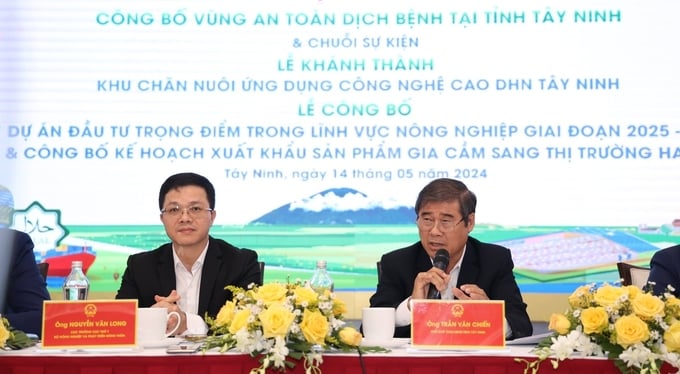
Tran Van Chien (right), Vice Chairman of the Tay Ninh Provincial People's Committee, provides information at the press conference. Photo: Tran Trung.
The Ministry of Agriculture and Rural Development, Tay Ninh Provincial People's Committee, De Heus, and Hung Nhon Group co-chaired a press conference on May 14 to outline the plans for the announcement of Tay Ninh province as a disease-free zone.
According to the organizing committee, in addition to the announcement of Tay Ninh province as a disease-free zone, the event will feature the inauguration of the DHN Tay Ninh high-tech livestock production area, the announcement of seven key agricultural investment projects from 2025 to 2030, and the plan for exporting poultry products to the Halal market.
Mr. Tran Van Chien, Vice Chairman of the Tay Ninh Provincial People's Committee, emphasized Tay Ninh province's strategic location within the southern key economic region, featuring numerous advantages for agricultural development, particularly in livestock production.
After recognizing that the establishment of disease-free zones and facilities is crucial for implementing livestock development strategies, Tay Ninh province has focused on enhancing productivity and quality in livestock farming over recent years. Additionally, the province has been making active efforts to restructure its livestock sector, with an emphasis on transitioning from small-scale to large-scale farming, and applying new technologies to control diseases.
"We encourage businesses to invest in high-tech slaughterhouses for livestock and poultry, diversify consumption markets, and establish high-tech livestock production and slaughtering chains," Mr. Chien added.
Tay Ninh is currently managing 81 VietGAHP-certified livestock facilities, one disease-free zone in Duong Minh Chau district, and six commune-level facilities in Go Dau district certified as safe from avian influenza and Newcastle disease. Additionally, the province houses 71 other certified disease-free livestock facilities. During the upcoming series of events, Tan Chau district will be officially recognized by the Department of Animal Health as a disease-free zone.
"Biosafe livestock production and the establishment of disease-free zones and chains for export represent proactive disease prevention and control measures, with the aim of reinforcing biosecure livestock production areas in the future. The establishment of disease-free zones to support export operations presents an excellent opportunity for Tay Ninh province to raise awareness, strengthen local disease prevention and control measures, and develop towards export. With the successful establishment of disease-free zones, Tay Ninh is poised to become an attractive destination for investors. The joint venture between De Heus and Hung Nhon Group is a testament to this," emphasized Mr. Tran Van Chien.
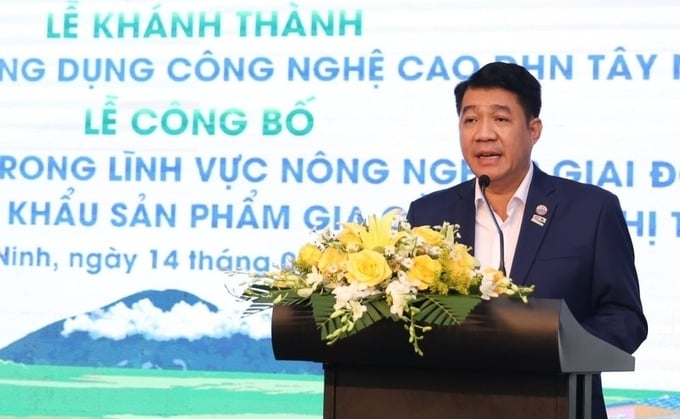
Mr. Vu Manh Hung, Chairman of the Board of Directors of Hung Nhon Group, at the press conference. Photo: Le Binh.
According to Mr. Vu Manh Hung, Chairman of the Board of Directors of Hung Nhon Group, the company has designated Tay Ninh province as a key priority area for its development strategy. As a demonstration of their commitment and professionalism, the De Heus - Hung Nhon joint venture will inaugurate the DHN Tay Ninh high-tech livestock production area on May 19.
"We will also organize groundbreaking ceremonies for seven key projects within the DHN Tay Ninh high-tech agricultural complex, which is a significant achievement in terms of timeline for Hung Nhon Group.
The total projected investment capital for the first two phases of the series of eight DHN Tay Ninh high-tech agricultural projects is 2,500 billion Vietnamese dong, positioning Tay Ninh province as the spearhead in Hung Nhon's investment structure," Mr. Vu Manh Hung revealed.
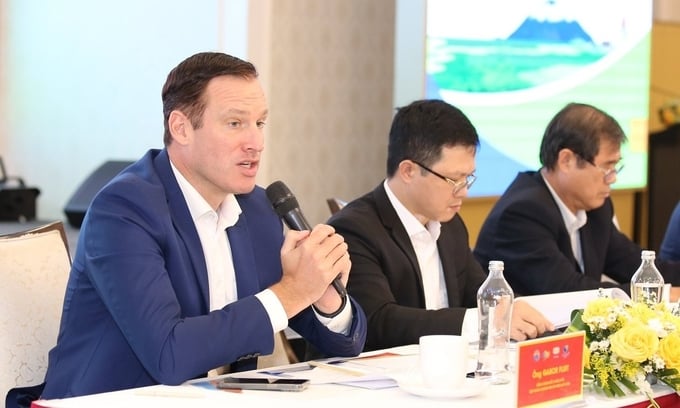
Mr. Gabor Fluit, CEO Asia at Royal De Heus, at the press conference. Photo: Tran Trung.
During the press conference, Mr. Gabor Fluit provided insights into the Netherlands' experience in establishing disease-free zones and effectively isolating infected areas to prevent the spread of diseases.
He emphasized the importance of designating disease-free zones in compliance with OIE/WOAH's definitions. Consequently, the CEO Asia at Royal De Heus aims to assist Vietnam in safely exporting meat products to other countries, and avoiding trade barriers raised by food safety regulations.
The successful establishment of disease-free zones will enable Vietnam to export pork products to Japan, South Korea, and even chicken breast to Europe. The value of chicken breast in the European market is currently two to three times higher than that in Vietnam," Mr. Gabor Fluit analyzed.
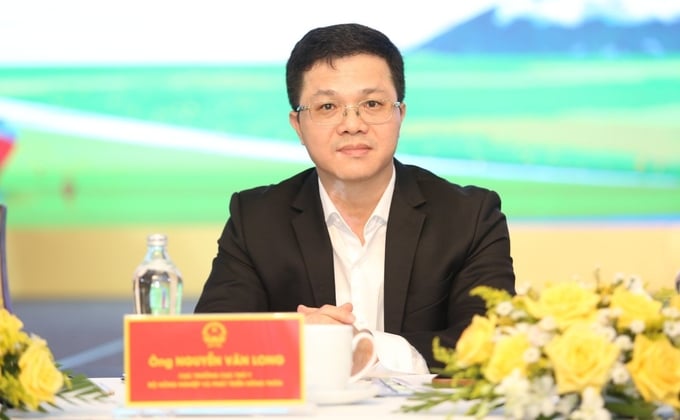
Mr. Nguyen Van Long, Director of the Department of Animal Health, shares information at the press conference. Photo: Tran Trung.
Mr. Nguyen Van Long, General Director of the Department of Animal Health, emphasized the importance of disease-free zones in the development of the agricultural sector, particularly in livestock production. According to the regulations of the World Organisation for Animal Health (OIE/WOAH), the export of animal products must strictly comply with the criteria and regulations pertaining to disease-free zones.
Mr. Long acknowledged and commended De Heus and Hung Nhon Group's success in establishing Tay Ninh province as a disease-free zone; and the responsible organization of a meaningful event series.
"As an exporter, we must comply with these regulations. The establishment of disease-free zones has been an ongoing effort in Vietnam, complemented by positive results in the export of livestock products. To date, Vietnamese pork products have been exported to various markets worldwide, including South Korea and Hong Kong. Additionally, our chicken products have been exported to Japan," reported Mr. Nguyen Van Long.

Representatives from De Heus and Hung Nhon Group making announcements regarding the DHN Charity Fund, featuring a budget of 30 billion Vietnamese dong. Photo: Le Binh.
During the press conference, representatives from De Heus and Hung Nhon Group also made several announcements regarding the DHN Charity Fund. The Fund, with a total budget of 30 billion Vietnamese dong, aims to eradicate hunger, reduce poverty; improve the lives of disadvantaged people; facilitate access to clean and safe food for economically disadvantaged populations, with a focus on maintaining food safety and hygiene standards.
Translated by Nguyen Hai Long
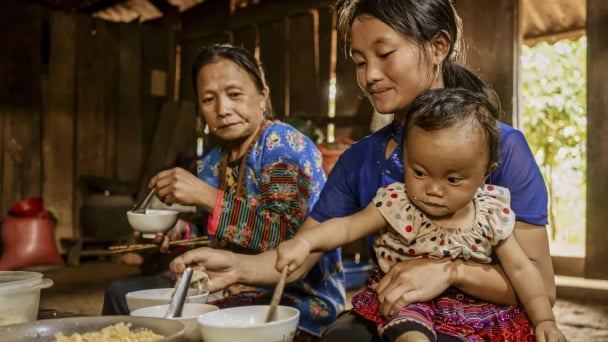
(VAN) 30 experts in health, agriculture and environment participated in a consultation workshop to inform the development of a methodological framework aimed at supporting Vietnam’s transition to a sustainable food system.
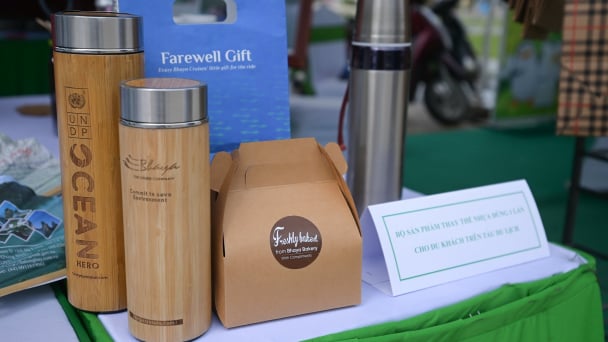
(VAN) Over the past five years, Quang Ninh Province has vigorously and synchronously implemented the ‘Say No to Plastic Waste’ campaign, yielding positive outcomes in advancing sustainable tourism.

(VAN) The prevention of plastic pollution necessitates collaboration among governments, businesses, and citizens. Today's little things contribute to a future free of plastic.

(VAN) This was the directive given by Deputy Minister Phung Duc Tien during a meeting with the Department of Livestock Production and Animal Health, and relevant stakeholders to prevent and control African swine fever.
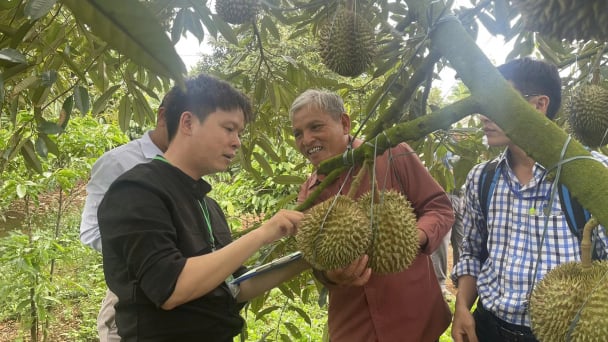
(VAN) For the durian industry to succeed, the value chain must fulfill its commitments to the government, the community, and international partners.

(VAN) Vaccinating juvenile pangasius helps reduce disease, antibiotic use, and farming costs, increasing profits for export-oriented farmers in An Giang.

(VAN) Due to a limited supply of workforce and competitive recruitment requirements, businesses struggle to retain talented veterinary human resources.